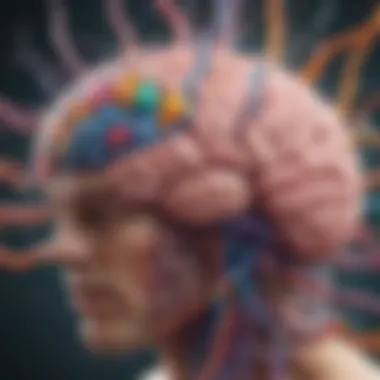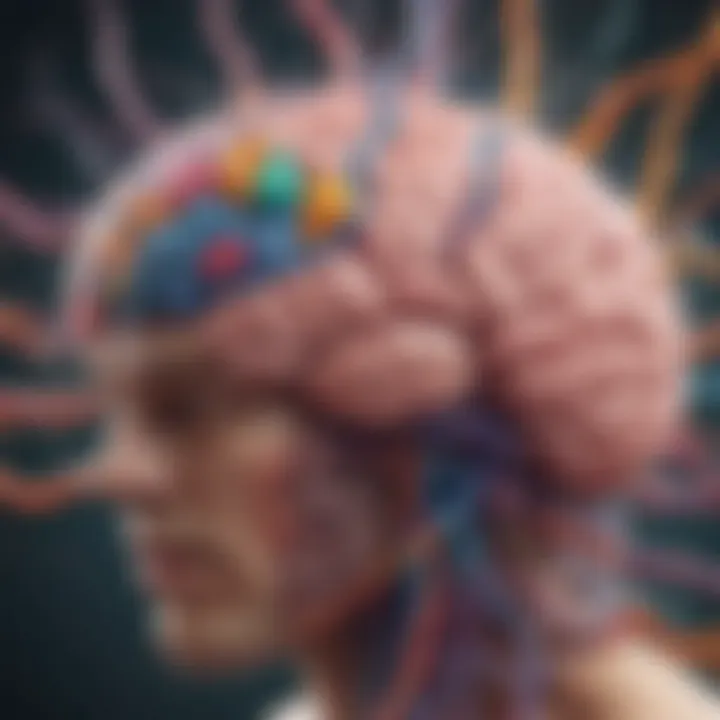Understanding the Gut-Brain Connection in 'Brain Maker'


Intro
In recent years, the nexus between our gut health and cognitive function has come under intense scrutiny. Among the pivotal texts in this area is David Perlmutter's Brain Maker. This influential work puts a spotlight on how the microbiome, the complex community of bacteria residing in our intestines, can influence not just our digestion but also our cognitive capabilities. Understanding this relationship can be a game changer, with astonishing implications for mental health.
What’s truly fascinating about this topic is that many people often overlook their gut as a player in their overall health. We're talking about the natural world residing within us, which influences everything from our immune responses to our mood and even our brain power. For those ready to dive headfirst into this world, Brain Maker offers a wealth of insights. In this article, we’ll explore the essence of the book, distilling down its core themes and offering actionable steps for leveraging gut health to boost brain function.
The Importance of Gut Health
When delving into the intricate relationship between our physiology and mental processes, gut health emerges as a cornerstone that cannot be overlooked. Understanding the gut’s role in cognitive function is particularly relevant today, as more individuals grapple with mental health issues and cognitive decline than ever before. The fascinating interplay between gut microbiota and brain function holds promising implications for enhancing overall well-being.
First off, it’s essential to grasp that our gut is not just a digestion factory; it's a complex ecosystem teeming with microbes that influence a myriad of bodily functions. The gut microbiome—home to trillions of microorganisms—plays a vital role in digestion, immune response, and even our mood regulation. The more we understand this, the clearer its significance becomes.
Research has drawn strong connections between gut health and cognitive function. A healthy microbiota can positively affect neurotransmitter production, impacting everything from memory to mood, creating an undeniable link between what we consume and how we think. Ignoring gut health might just be like throwing away the keys to our mental faculties.
In addition, consider that emerging evidence suggests that an imbalanced microbiome, often referred to as dysbiosis, has been linked to conditions such as anxiety, depression, and cognitive disorders. The implications extend far beyond the stomach, indicating that our dietary choices can shape not only our physical health but also our mental landscape.
Key Benefits of Prioritizing Gut Health
- Enhanced Cognitive Function: A balanced microbiome can contribute to improved clarity of thought and memory retention.
- Mood Regulation: The gut plays a crucial role in the production of serotonin, often dubbed the "happy hormone."
- Reduced Risk of Neurodegenerative Diseases: A healthy gut may lower the likelihood of diseases such as Alzheimer's through anti-inflammatory pathways.
Ultimately, by nourishing our gut, we empower our cognitive potential, blur the stagnant lines between body and mind, and embark on a journey toward holistic wellness.
Overview of 'Brain Maker'
In a world increasingly recognizing the link between gut health and cognitive function, David Perlmutter's book, 'Brain Maker', provides a compelling framework to rethink mental wellness. This section serves as a foundation, laying out essential elements that underscore the significance of this discussion. Not just a guide to understanding gut microbiota, it challenges outdated perceptions of brain health.
Author's Credentials and Perspective
David Perlmutter, a neurologist with an extensive background in dietary medicine, is no stranger to conversations concerning health and wellness. His credentials lend weight to the ideas presented in 'Brain Maker'. Having authored several books that have made waves in both medical and popular circles, Perlmutter shifts the conversation from mere genetic predisposition to how lifestyle unfolds within the context of gut health.
With a keen understanding of how the brain interacts with bodily systems, he doesn't just throw around scientific jargon. Perlmutter conveys his insights with clarity, bringing to light complex topics in approachable language. His perspective is grounded in a blend of scientific research and clinical experience. The reader doesn't just get theories; they receive a comprehensive examination of how to apply this knowledge practically.
Core Premises of the Book
At its core, 'Brain Maker' presents several pivotal ideas that serve as an entry point into the gut-brain connection:
- Gut Microbiota as Key Players: The book posits that our gut microbiome is not just a collection of bacteria. Rather, it's a bustling community that communicates with our brain and influences various mental states.
- Dysbiosis and Cognitive Decline: Perlmutter discusses how an imbalance in our gut bacteria, or dysbiosis, can correlate with neurodegenerative diseases, mental health disorders, and a myriad of cognitive issues. This direct linkage places gut health front and center in discussions surrounding mental performance.
- Dietary Interventions Matter: The narrative isn't merely observational. The author provides actionable insights on how dietary modifications can foster beneficial gut flora. It's clear that food choices aren't just about physical well-being; they impact cognitive capability, too.
"The gut is a critical player in brain health; what we eat fundamentally impacts how we think and feel."
- The Role of Probiotics: Another significant premise of the book is the encouragement of probiotic-rich diets, discussing how these foods can support mental health and cognitive function.
- Personal Responsibility: Ultimately, Perlmutter emphasizes the idea that we hold the reins to our health through informed dietary choices and lifestyle changes. This proactive approach invites readers to reflect on their own habits and empowers them to make beneficial adjustments.
In essence, 'Brain Maker' serves as an invitation to explore the depths of one's diet and its far-reaching effects on mental clarity and emotional stability, framing gut health not as a niche topic but as a cornerstone in the broader conversation about holistic wellness.
Microbiome Diversity and Mental Health
The intricate dance between microbiome diversity and mental health is a topic ripe for exploration. The microbiome, which consists of trillions of microorganisms living in and on our bodies, plays a crucial role in various aspects of our health—not just physical, but also mental well-being. A flourishing and diverse microbiome is akin to a vibrant community, where different strains of bacteria work harmoniously to regulate numerous bodily functions.
Research suggests that a rich microbiome acts as a buffer against stress and anxiety, promoting a sense of well-being. Conversely, a lack of diversity may pave the way for various mental health issues. For example, individuals with a less diverse gut microbiome often show signs of anxiety and depression. It seems that when certain microbial populations dominate, others dwindle, disrupting the delicate balance necessary for optimal mental functioning.
Some benefits tied to microbiome diversity include:
- Enhanced cognitive function: A diverse set of gut bacteria has been linked to improved memory and learning capacity.
- Reduced inflammation: Microbial diversity helps ward off inflammatory responses, often linked to mood disorders.
- Improved gut-brain signaling: A well-rounded microbiome supports the communication pathways between the gut and brain, contributing to emotional regulation.
Considering these factors, fostering a diverse microbiome isn't just about digestion; it's an integral part of promoting mental health. In light of these insights, maintaining a variety of microbial species can be seen as essential to emotional resilience.


"The gut is the gateway to brain health; when the gut jeopardizes its ecosystem, the brain pays the price."
Links Between Dysbiosis and Neurodegeneration
Dysbiosis, a term that describes an imbalance in the gut microbiome, has significant implications for neurodegeneration. With conditions like Alzheimer's Disease and Parkinson's Disease on the rise, understanding the relationship between dysbiosis and cognitive decline becomes all the more important. As research unfolds, connections between gut health and brain degeneration grow stronger.
Clinical studies indicate that people with neurodegenerative diseases often exhibit a distinct microbiota composition when compared to healthy individuals. For instance, reduced levels of beneficial bacteria such as Bifidobacterium and Lactobacillus could be linked to increased inflammatory markers found in these diseases.
The implications of this remain profound:
- Inflammation: Inflammation in the gut can lead to systemic inflammatory responses, which researchers suspect play a role in brain degeneration.
- Gut-derived neurotransmitters: The gut microbiome produces neurotransmitters like serotonin, which have vital roles in mood regulation. Dysbiosis might hinder this supply.
- Metabolites production: Beneficial gut bacteria produce short-chain fatty acids (SCFAs), which have been shown to have neuroprotective effects.
In order to mitigate these risks, individuals might consider lifestyle changes that emphasize gut health, such as dietary adjustments or targeted probiotic supplementation.
Role of Probiotics and Prebiotics
Probiotics and prebiotics can be viewed as keys that unlock the potential of a diverse microbiome. While probiotics are live microorganisms that confer health benefits when administered in adequate amounts, prebiotics serve as food for these beneficial bacteria, helping to encourage their growth. This symbiotic relationship underpins a healthy gut and, by extension, a healthy mind.
Incorporating foods rich in probiotics, like yogurt, kefir, and fermented vegetables such as sauerkraut into one's diet is a practical approach. On the flip side, foods high in prebiotic fibers—like garlic, onions, and bananas—can help feed the positive bacteria residing in our guts. The following points illustrate their impact:
- Cognitive Benefits: Numerous studies suggest that consumers of probiotic-rich foods often experience lower levels of anxiety and improved mood.
- Gut Health: Prebiotics, when consumed regularly, can enhance the microbial diversity necessary for overall health.
- Infection Resistance: By fostering a balanced microbiome, probiotics can bolster the immune system and protect against harmful pathogens, further reducing inflammation that often correlates with cognitive issues.
Strategies to integrate these elements into daily life can facilitate positive changes in mental wellness, demonstrating that nurturing our gut can significantly influence our cognitive health.
Dietary Interventions for Cognitive Enhancement
Diet plays a fundamental role in shaping not only our physical health but also our mental acuity. In light of 'Brain Maker' and its exploration of the gut-brain connection, dietary interventions emerge as significant players in enhancing cognitive function. With a broad spectrum of potential benefits linked to what we consume, it's vital to understand how dietary choices impact both gut health and cognitive performance.
Identifying Beneficial Foods
When it comes to boosting cognitive function, certain foods consistently shine. These beneficial foods contribute positively to the gut microbiota, ultimately enhancing brain health.
- Fruits and Vegetables: These are packed with vitamins, minerals, and antioxidants. For instance, blueberries have been extensively studied for their neuroprotective effects, potentially improving memory and cognitive performance.
- Fatty Fish: Fish like salmon, mackerel, and sardines are rich in omega-3 fatty acids. Omega-3s are essential for brain health, known to support cognitive functions and possibly protect against cognitive decline.
- Whole Grains: Foods such as oatmeal and brown rice provide the body with steady energy, which is crucial for optimal brain function.
- Fermented Foods: Foods like yogurt, kimchi, and sauerkraut contain probiotics. These beneficial bacteria can enhance gut health, potentially leading to improved mental health outcomes.
- Nuts and Seeds: Rich in healthy fats, fiber, and protein, walnuts and flaxseeds are particularly noted for their brain-boosting properties due to their high omega-3 content.
Incorporating these into a daily diet can make a notable difference in cognitive performance and overall mental well-being.
Avoiding Harmful Substances
Equally important as incorporating beneficial foods is the need to avoid harmful substances that can sabotage cognitive health. Some dietary components can disrupt gut microbiota and negatively affect brain function.
- Processed Foods: Often high in sugars and unhealthy fats, processed foods can lead to dysbiosis in gut bacteria, which is associated with cognitive issues. Foods laden with artificial preservatives should be limited.
- Sugary Drinks: Excess sugar can adversely affect cognitive abilities. Regular consumption of sodas and sweetened beverages is linked to inflammation, which can impair cognitive function.
- Trans Fats: Found in many fried and processed foods, trans fats can cause neuronal damage and inflammation, potentially leading to cognitive decline. It’s best to steer clear of these fats when planning a diet.
- Excessive Alcohol: While moderate alcohol consumption may not pose significant risks, excessive drinking can create havoc in gut health and impair cognitive abilities.
Avoiding these harmful substances is a crucial step toward maintaining optimal brain function and enhancing mental acuity.
"The right food can enhance cognitive function, while poor dietary choices can detrimentally impact brain health. Making informed dietary decisions is paramount for those looking to boost their mental performance."
End
In summary, dietary interventions constitute a robust approach for cognitive enhancement. By focusing on beneficial foods and steering clear of harmful substances, individuals can optimize their gut health, paving the way for improved cognitive function. The synthesis of insights from 'Brain Maker' with tangible dietary practices can empower readers to take charge of their mental well-being, transforming their culinary choices into tools for cognitive empowerment.
The Impact of Stress on Gut Microbiota
Understanding the interplay between stress and gut microbiota is vital when discussing cognitive health and function. Stress doesn't just affect the mind; it has a profound impact on the body, particularly the gut. This section highlights how stress alters gut microbiota composition, leading to potential negative outcomes for mental well-being. If one understands the nuances of stress, tackling gut issues becomes more manageable. After all, our emotional states influence physical health in a myriad of ways.
Understanding the Stress Response


When an individual encounters stress, the body goes into a survival mode, often referred to as the 'fight or flight' response. This physiological reaction is orchestrated by the release of hormones such as cortisol and adrenaline. These hormones trigger a cascade of events that affect various body systems. Research illustrates that stress can lead to changes in gut permeability and inflammation.
Key Points on the Stress Response:
- Cortisol Release: Prolonged elevation leads to dysbiosis, where the balance of microbiota is disturbed.
- Inflammatory Markers: Increased stress can result in higher levels of inflammation in the gut, impacting its function.
- Gut Motility: Stress can cause changes in gut motility, which may lead to symptoms like constipation or diarrhea.
As the gut houses a significant portion of the immune system, understanding stress response ultimately underscores the importance of gut health in our overall well-being.
Strategies for Stress Management
Effective stress management is essential for maintaining gut health. Implementing strategies can help mitigate the adverse effects that stress has on our microbiota, thus promoting better cognitive function. Here are some practical approaches:
- Mindfulness Meditation: This practice has shown to lower cortisol levels and improve gut health.
- Regular Physical Activity: Engaging in exercise helps release endorphins and manages stress effectively.
- Balanced Nutrition: Foods rich in omega-3 fatty acids (like salmon) and probiotics (found in yogurt and kefir) can bolster both mental and gut health.
- Adequate Sleep: Ensuring enough restful sleep can help reset the body and reduce stress hormone levels.
- Social Connections: Maintaining relationships is crucial as social support can act as a buffer against stress.
"The mind and gut are intricately linked; by nurturing both, one can harness the power of holistic health."
By integrating these strategies into daily routines, individuals can work towards restoring balance between stress and gut microbiota. Understanding and managing stress is not just an act of self-care but a fundamental aspect of improving cognitive and overall health.
Exploring Research Findings
Understanding the connection between gut health and cognitive function is not merely an academic exercise; it's a growing frontier within nutritional science and psychology. The exploration of research findings related to this topic fuels the dialogue about how the gut microbiome can influence everything from mood to memory and beyond. This section aims to shed light on significant studies that bridge microbiota and brain function, highlighting their implications and benefits for our daily lives.
Recent Studies on Gut Health
A surge of interest has emerged surrounding the gut microbiome in the last decade. Researchers are increasingly uncovering how microbial communities play pivotal roles in health. For instance, a recent study in Nature Neuroscience suggested that specific probiotics could significantly reduce anxiety in participants. The results of this research claim that introducing Lactobacillus strains into the diet influences the serotonergic system, a pathway crucial for mood regulation. Furthermore, studies from Journal of Psychiatric Research indicated that individuals with a richer diversity of gut bacteria tend to exhibit lower levels of depression and anxiety.
Some notable findings include:
- Microbiome Diversity: Greater diversity within gut bacteria correlates with enhanced overall health and resilience against mental disorders.
- Gut Bacteria and Neurotransmitters: Certain gut bacteria are linked to the production of neurotransmitters, such as dopamine and serotonin, essential for regulating mood and emotional well-being.
- Inflammation Regulation: Research reveals that gut health impacts inflammation, influencing cognitive functions and conditions like Alzheimer’s disease.
This evolving body of evidence establishes gut health as pivotal not just for physical health but also for maintaining cognitive function, offering a richer understanding of the gut's profound impact on our mental state.
Clinical Trials Highlighting Improvements
To truly appreciate the practical implications of gut health on cognitive function, one must look at clinical trials that provide empirical backing to many claims. Various trials have illustrated the efficacy of dietary interventions that target the microbiome. A comprehensive study conducted by University of California, San Diego showed promising results: participants who adhered to a gut-friendly diet rich in fiber and fermented foods demonstrated significant improvements in cognitive tests compared to the control group.
Other trials focus on probiotics, which reveal remarkable findings.
- The Probiotics and Mental Health Study showed that a specific strain, Bifidobacterium longum, significantly decreased self-reported anxiety levels.
- Further investigation by Harvard Medical School highlighted the potential of probiotics in enhancing brain-derived neurotrophic factor (BDNF) levels, a key player in neuroplasticity and cognitive enhancement.
The connection between gut health and cognitive function is not just a theory; it's backed by growing clinical evidence, suggesting that what we eat can profoundly influence how we think and feel.
These studies are vital in shaping a robust understanding of how we can not only prevent cognitive decline but also enhance cognitive performance through informed dietary choices.
Practical Applications of 'Brain Maker'
Understanding the principles outlined in 'Brain Maker' isn’t just theoretical; it has real-world implications that can transform how we approach our health. The connections between gut health and cognitive function are profound, and this chapter focuses on practical ways to apply these concepts in everyday life. By leveraging the insights provided in the book, individuals can make informed choices that enhance their overall well-being. The importance of practical applications lies not just in theory but in the actionable steps you can take to integrate these concepts into daily habits.
Integrating Concepts into Daily Life
To truly benefit from the wisdom in 'Brain Maker', it’s crucial to weave these ideas into the fabric of your daily routines. Here are some concrete strategies:
- Mindful Eating: Pay attention to the foods you choose. Incorporate a variety of fiber-rich plants, fermented foods, and omega-3 sources. Think of your plate as a palette for gut health.
- Regular Activity: Exercise isn’t just for the body; it’s for the mind too. Regular physical activity can positively affect the microbiome, boosting cognitive function as well.
- Sleep Hygiene: Developing a nighttime routine can enhance sleep quality, which in turn supports gut health. Aim for a consistent sleep schedule and create a restful environment.
- Stress Reduction Practices: Include mindfulness techniques like yoga or meditation that not only relieve stress but may also support a healthier gut microbiome. Everything from breathing exercises to momentary pauses can make a difference.
By consciously incorporating these habits into our daily lives, we create a nurturing environment for our gut and brain to thrive, which could lead to sharper cognitive skills and a more resilient mind.


Creating a Personalized Nutrition Plan
Crafting a personalized nutrition plan grounded in the principles of 'Brain Maker' is a step towards taking control of one’s health. Here’s how to get started:
- Assess Your Current Diet: Begin by keeping a food diary to identify what you eat regularly. Take note of patterns, portion sizes, and effects on mood and energy.
- Research Gut-Friendly Foods: Incorporate foods known to support the microbiome, such as yogurt, kefir, sauerkraut, and prebiotic fiber found in garlic, onions, and bananas. The key is diversity, so varied food choices must be encouraged.
- Evaluate and Eliminate: Make a plan to reduce inflammatory foods that could negatively impact gut health, such as processed sugars and trans fats. Addressing food intolerances can also be an eye-opener.
- Consult a Nutritionist: Sometimes a professional touch helps. A nutritionist can provide insights tailored to both your condition and preferences, helping navigate the vast landscape of dietary options while aiming for cognitive improvements.
A carefully crafted meal plan based on nutritional science can yield impressive outcomes, helping to sharpen focus and enhance overall cognitive function.
"It’s not just about the food you eat, but how it interacts with your microbiome and influences your brain’s performance."
Engaging with the practical applications from 'Brain Maker' places individuals on a proactive path toward better health. With simple yet effective strategies, one can make lasting changes to their lifestyle that support both gut and cognitive health, leading to a higher quality of life.
Potential Critiques of 'Brain Maker'
Understanding criticisms of 'Brain Maker' is vital for any thoughtful reader. While the book sheds light on the intricate relationship between gut health and cognitive function, it also invites scrutiny. Evaluating the critiques can deepen one's understanding of both the content and the broader science surrounding the microbiome. This section aims to explore key elements pertaining to its evidence base and potential misunderstandings.
Evaluating the Evidence Presented
One of the most significant critiques of 'Brain Maker' is the strength and validity of the research backing the claims made. Many readers wonder how robust the scientific studies are that Perlmutter cites. Are they comprehensive enough to establish a causal relationship between gut microbiota and cognitive function? Is the evidence cherry-picked, or does it truly reflect a spectrum of research findings?
Critics argue that while the book offers intriguing anecdotes and selected studies, it lacks a thorough examination of opposing perspectives. Research in the field of microbiome and its influence on the brain is burgeoning, yet it encompasses a wide array of findings, some conflicting. For example, certain studies may indicate a clear link between specific probiotic strains and improvements in cognitive function, while others find no significant impact at all. Therefore, the readers must weigh the evidence critically, seeking out peer-reviewed articles and larger meta-analyses that may provide a more rounded perspective on this topic.
Furthermore, there’s a danger of oversimplification. The microbiome is incredibly complex, and blaming cognitive decline solely on gut health risks overlooking other contributing factors like genetics and societal influences. After all, just as disease doesn’t hinge on a singular factor, neither does mental health.
Controversial Claims and Misunderstandings
Another layer of critique involves some of the more sensational claims made in 'Brain Maker'. Certain phrases might feel like hyperbole to scientifically inclined readers, crafting a narrative that can sometimes appear overly persuasive. The assertion that simply tweaking the gut microbiome can fix chronic mental health issues overlooks the multifaceted interplay of biological, psychological, and environmental elements.
Misunderstandings can arise when readers interpret these claims without the required caution. For instance, the contrast between good and bad bacteria may be painted in stark terms, but in reality, the microbiome has a more nuanced relationship with health.
Moreover, the suggestion that one can achieve optimal cognitive performance via dietary changes alone can lead to disillusionment. Yes, diet is critical, but for many, achieving mental clarity or improving mental health requires a holistic approach, which might include therapy, exercise, and medication—things that the book doesn’t emphasize enough.
As such, readers should approach 'Brain Maker' as a starting point rather than an all-encompassing guide, preparing themselves with a broader understanding of the diverse factors that impact both gut health and cognitive function.
"The microbiome's influence is undeniable, yet it is one piece of a much larger puzzle."
In summary, while 'Brain Maker' propels awareness of the gut-brain connection, addressing these critiques proactively can serve to enlighten readers, urging them toward more comprehensive views of health. By critically evaluating the evidence and acknowledging the potential for misunderstanding, we empower ourselves to act on our health with informed, nuanced decision-making.
Epilogue: The Path Forward
As we draw this exploration of the connections between gut microbiota and cognitive function to a close, it becomes clear that understanding this intricate relationship is not merely an academic exercise; it holds tangible implications for improving our overall well-being. David Perlmutter’s insights in Brain Maker illuminate how our dietary choices, lifestyle habits, and even stress management can significantly influence brain health through the pathway of gut microbiota. This conclusion acts as a vital bridge connecting concepts discussed throughout the article to potential actionable steps for readers.
Revisiting Key Takeaways
Before we leap into larger implications, it's worthwhile to reflect on the essential points that have emerged from our inquiry:
- Gut Microbiota's Role: The gut microbiome is not just the body's digestive assistant; it's a key player in regulating mood, cognitive function, and even neurological conditions. The balance of various bacteria can dictate mental clarity and emotional stability.
- Dietary Choices Matter: Foods high in fiber, omega-3 fatty acids, and antioxidants can support the growth of beneficial gut bacteria. On the flip side, processed foods and high sugar intake can foster an environment for harmful bacteria to thrive.
- Understanding Dysbiosis: The term dysbiosis refers to an imbalance in the microbiome, often linked with various mental health issues, including anxiety and depression. Maintaining a diverse microbiome through proper nutrition can mitigate risks associated with these conditions.
These points serve not just as takeaways, but also as a foundation for a broader understanding of how interconnected our bodily systems are, especially the gut and the brain.
Empowering Readers for Change
Now that we’ve unpacked foundational concepts, it’s time to discuss how readers can implement these lessons into their everyday lives. Awareness leads to empowerment, and informed individuals can make proactive choices that enhance their mental health:
- Start Small: Introduce one or two beneficial foods into your diet this week. For example, adding a serving of fermented foods, such as yogurt or sauerkraut, can foster positive changes in your gut microbiome.
- Monitor Your Mood and Diet: Keep a food diary, noting how different foods affect not just your physical health, but also your mood and cognitive function.
- Learn Stress-Reduction Techniques: Practices such as mindfulness, yoga, or even simple breathing exercises can reduce the negative impact of stress on your gut health. Recognizing stress triggers and managing them is essential in protecting the microbiome.
By taking these steps, readers can lay the groundwork for a healthier gut, which in turn promotes better cognitive function. The journey toward enhanced mental well-being doesn’t have to be overwhelming; often, small, incremental changes resonate the most with lasting impacts.
"The connection between gut health and mental clarity is now more than ever the frontier of healing in the holistic realm."
Ultimately, the path forward is one of continuous learning and adaptation. By fostering a deeper understanding of the relationship between our gut and our brain, readers can not only enhance their cognitive functions but also pave the way toward a more vibrant and fulfilling life.















